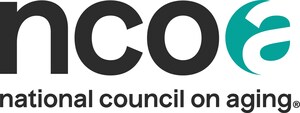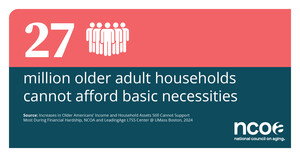National Council on Aging Provides Economic Security and Benefits Assistance Programs to Help
WASHINGTON, Oct. 15 /PRNewswire-USNewswire/ -- The release of today's zero cost-of-living adjustment (COLA) by the Social Security Administration (SSA) presents yet another daunting challenge for millions of older adults who are still struggling to make ends meet in today's economy.
(Logo: http://photos.prnewswire.com/prnh/20100615/NCOALOGO)
(Logo: http://www.newscom.com/cgi-bin/prnh/20100615/NCOALOGO)
As a result of the recent economic recession, the consumer price index (CPI-W) that is used to make automatic cost-of-living adjustments to Social Security benefits did not increase from the previous year. Consequently, because of the formula under existing law, Social Security beneficiaries will see no increases in their benefits in 2011.
With the Medicare Part B premiums scheduled to increase, the COLA freeze will actually result in a benefit cut for many seniors already forced to choose between heating the house and putting food on the table.
As a partial solution, NCOA is urging Congress to extend the Qualified Individual (QI) Medicare Savings Program, which is set to expire on Dec. 31, 2010. This program pays for the Medicare Part B premiums of many Medicare beneficiaries with incomes between 120-135% of the federal poverty level (about $13,000 to $14,600 in 2010) and who are not eligible for medical assistance. With no cost of living increase and the loss of their QI benefit, many beneficiaries would likely have no choice but to drop their Part B coverage.
This zero adjustment will have a significant impact on economically vulnerable older adults. A recent study by the Carsey Institute showed that a greater percentage of older Americans are staying in the workforce longer, encompassing nearly a quarter of women and a third of men between ages 65 and 69, many of them working full time.
As for retirees, a third of retired older adults rely on Social Security for more than 90% of income. In 2009, 9.9% of adults aged 65 and older lived at or below the poverty level, and 31.4% were considered economically insecure, living at or below 200% of poverty.
"After a lifetime of hard work and raising a family, older Americans need and deserve basic economic security," said Jim Firman, president and CEO of the National Council on Aging (NCOA). "NCOA has resources to help older Americans cover basic needs and help make ends meet."
Solutions from NCOA
NCOA offers a variety of programs to help older adults connect with services that help them build financial stability and security for themselves and their families.
- NCOA's Economic Security Initiative offers innovative programs in 12 communities to help economically disadvantaged older adults cut through red tape and create a plan to build their own economic stability and security. The service includes one-on-one assistance, counseling, and follow-up as they find job training, assistance with healthcare and prescription drugs, housing and nutrition programs, and financial planning.
- NCOA's National Center for Benefits Outreach and Enrollment (NCBOE) helps organizations enroll seniors with limited means and younger adults with disabilities in a wide range of benefits programs. NCOA's online screening tool www.BenefitsCheckUp.org has helped more than 2.6 million people discover their eligibility for more than $9.0 billion in annual benefits that cover everything from prescriptions to home energy and food.
- NCOA's Senior Community Service Employment Program (SCSEP) offers valuable on-the-job training and job placement that helps older workers, particularly those who are low-income or disadvantaged, build job skills and confidence. NCOA currently operates 27 SCSEP projects in 11 states. SCSEP is funded by a grant from the U.S. Department of Labor.
More information on NCOA's economic security initiative and workforce development ideas can be found at www.ncoa.org/enhancing-economic-security.
About NCOA
The National Council on Aging is a non-profit service and advocacy organization headquartered in Washington, D.C. NCOA is a national voice for older Americans - especially those who are vulnerable and disadvantaged - and the community organizations that serve them. It brings together non-profit organizations, businesses and government to develop creative solutions that improve the lives of all older adults. NCOA works with thousands of organizations across the country to help seniors find jobs and benefits, improve their health, live independently, and remain active in their communities. For more information, please visit www.NCOA.org
SOURCE National Council on Aging
WANT YOUR COMPANY'S NEWS FEATURED ON PRNEWSWIRE.COM?
Newsrooms &
Influencers
Digital Media
Outlets
Journalists
Opted In






Share this article